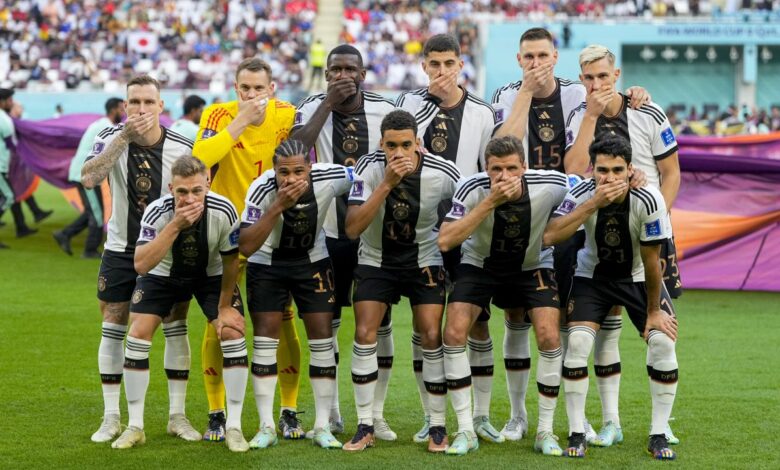
CNN – Football pundits on Qatar’s Alkass Sports channel mocked the German football team following its World Cup exit – by mimicking the players’ protest over human rights.
A video on the channel’s Twitter page posted on Thursday shows former Kuwaiti footballer Jamal Mubarak covering his mouth with his left hand and waving goodbye with the right, then calling on former Egyptian goalkeeper and fellow analyst Essam El-Hadary to join him.
Soon after, El-Hadary and other pundits then cover their mouths and wave goodbye – apparently in celebration of Germany’s exit.
The gesture mimics what the German players did to protest against FIFA’s decision to ban the “OneLove” armband that many European captains had been hoping to wear in Qatar in support of LGBTQ rights.
Ahead of Germany’s first match on November 23, the team’s starting lineup posed with their right hands in front of their mouths, a gesture to oppose what they saw as a clampdown on free speech.
Germany lost that game to Japan in a shocking upset. A subsequent victory against Costa Rica on Thursday was not enough for Germany to make it out of the group stage and through to the last 16.
“Thank God, today all the Arab and Muslim nations (are) praying that Japan qualifies with any team, but the most important thing is Germany’s exit,” Mubarak said on Alkass Sports channel.
The segment aired on the channel’s al-Majlis show hosted by Qatari presenter Khalid Jassem and featuring Arab football analysts, including Mubarak, El-Hadary and Iraqi former player Younis Mahmoud.
Following Germany’s 1:1 draw against Spain last Sunday, Jassem said in an al-Majlis episode that he was “shocked” at Germany’s protest.
“You [Germany] are supposed to respect our customs, traditions, culture and religion in the same way we respect your customs, traditions and culture,” Jassem said. “When we go to Germany or other places, we respect the rules and laws, and respect everything that is dear to the society there.”
In a series of tweets last week, the German Football Federation stood by the protest, saying, “It wasn’t about making a political statement – human rights are non-negotiable. That should be taken for granted, but it still isn’t the case. That’s why this message is so important to us. Denying us the armband is the same as denying us a voice.”
Before the tournament, captains from England, Wales, Belgium, the Netherlands, Switzerland, Germany and Denmark had planned to wear the armbands – which feature a striped heart in different colors to represent all heritages, backgrounds, genders and sexual identities – before FIFA warned players they could receive a yellow card if they did so.
In the buildup to the World Cup, host nation Qatar – where homosexuality is illegal and punishable by up to three years in prison – has come under criticism for its stance on LGBTQ rights.
However, the country has insisted that “everyone is welcome” at the tournament, adding in a statement to CNN this month that “our track record has shown that we have warmly welcomed all people regardless of background.”
FIFA’s decision to sanction players for wearing the “OneLove” armband has nevertheless drawn anger, with the Football Supporters’ Association, the representative body for football supporters in England and Wales, saying it “feels betrayed.”
“Since 2010 we have been raising questions about the suitability of Qatar as a World Cup host,” a statement from the FSA said.
CNN’s George Ramsay and Zayn Nabbi contributed reporting.




